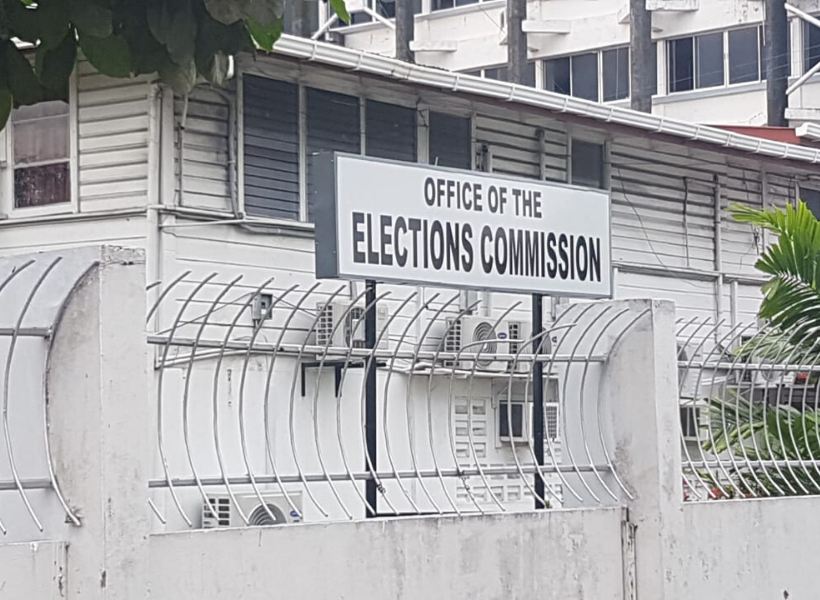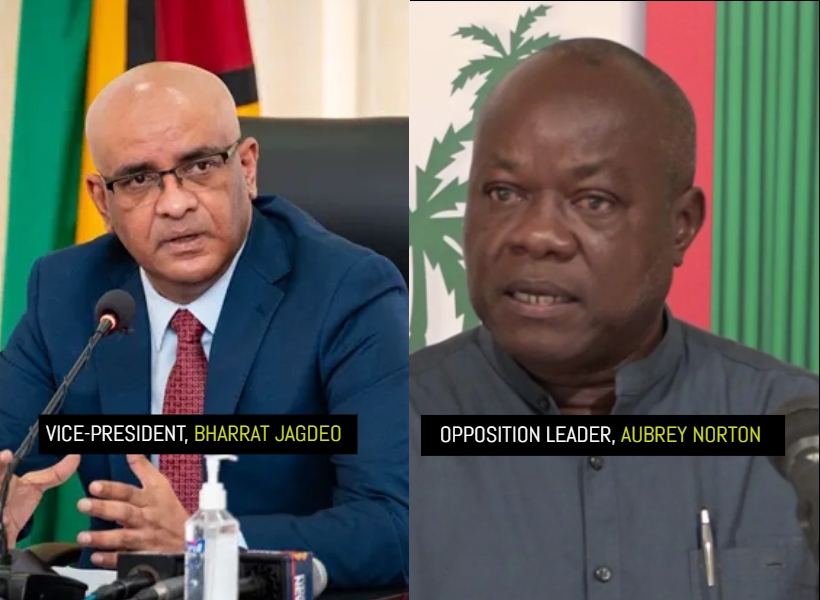By Kiana Wilburg
Opposition Leader Aubrey Norton used the 2024 budget debates to unveil his “People Centered Development Strategy” (PCDS).” Should he win the 2025 General and Regional Elections, he assured that this “strategy” would be the key to ending poverty. He said it would ensure meaningful investments in health, housing and water, energy, education, and other social services. Upon examining Norton’s plans, Vice President, Dr. Bharrat Jagdeo said, “It is imbecilic at best.”
During a press engagement on Thursday at Freedom House, the vice president spent about 30 minutes dissecting Norton’s paper-thin strategy.
Referencing his own party’s rich experience in his regard, he pointed to the National Development Strategy (NDS), which has six volumes. Those documents outline a methodical approach to building out a world-class economy for Guyana. Though crafted in the 1990s, Jagdeo explained that the umbilical cord of that document remains linked to every budget that is passed by his party.
Further, Jagdeo said Norton’s so-called plan for the people is unoriginal as it makes a juvenile attempt to replicate aspects of the NDS. That aside, Jagdeo exposed how Norton contradicts himself with his criticisms of the PPP/C’s budgets.
“The 2024 budget has over $135B for education, health has $130B, housing and water got over $100B, energy got $96B, transportation got nearly $200B, then there is $50B for social services. It’s the same things that he says he wants to make a priority of his people-centred development strategy, yet he cusses down the budget as doing nothing for the people,” said Jagdeo. The vice president expressed confidence that right thinking citizens would not be swindled by Norton’s slogans, confusion, and contradictions.
PUBLIC SERVANTS
Jagdeo also dismantled another argument proffered by Norton regarding public servants’ salaries and its share of non-oil revenues.
In this regard, Norton referenced Professor Clive Thomas, a respected economist, for a series of articles he did in 2012. Those publications examined how the income in an economy is allocated between the government and its people.
The opposition leader had said, “In 2024, the public servant will receive 2% of all the income Guyana earns. This means that the public servant will keep 1.92% of that money (after tax). The Minister (of Finance, Dr. Ashni Singh) told this Assembly that inflation will be 2.5% in 2024.
“What it means then is that the public servant in this oil-rich country will get the benefit of 1.88% of the money earned.” With that share of income, Norton said the public servant can hardly believe that the government is grateful for their service.
Jagdeo, however, urged citizens not to allow their minds to believe this form of “counterfeit economics”. “He has taken the income earned by the entire country, including private sector, and painted a twisted picture. The fact is that we have 54,000 public servants, a very important group and they receive $127B a year in compensation…A better indicator is how much is paid in wages and salaries across the country,” the Vice President said.
He noted that the total non-oil revenue the country receives is $427B. Public servants’ wages are nearly 30 percent of this. If oil revenue is added, Jagdeo said this jumps to $667B. He said the share public servants get deflated slightly to one fifth or about 19 percent as a share of government revenue. But it is all a matter of how the numbers are used, he added. Overall, Jagdeo noted that Guyana’s public servants enjoy a high percentage of the income earned directly, as well as indirectly.
“In school, you would get an F grade for this type of metric Norton wants to use and policy wise, it is meaningless and it doesn’t even make economic sense…it is pure nonsense,” he added.
ECONOMIC CHANGES
Jagdeo then turned his attention to another infantile caution by Norton—that Guyana’s economic structure is changing with oil’s growing dominance. The vice president said this is something his party has lamented for seven years. Even more important than this obvious reality is how authorities respond. The former Head of State explained that the government’s plan has been to invest heavily in those sectors that will outlast the pre-oil era. This includes a strategic focus on agriculture.
“The non-oil growth won’t be spectacular, but it keeps the economy diversified, and the resource curse at bay, and we don’t suffer the same fate as other nations,” he explained.
DEBT PROFILE
Regarding Guyana’s debt profile, the vice president said here again that this nation is the envy of the world. He compared Guyana’s debt profile to those of the “Group of 20” or “G20”, an international forum of 19 countries and the European Union, which addresses major issues related to the global economy.
He explained that G20 is responsible for 80 percent of the world’s Gross Domestic Product (GDP) and 75 percent of global trade. When compared to the debt profile of these nations that are considered global powerhouses, Jagdeo explained that Guyana’s is amongst the lowest.
“If you look at their debt-to-GDP ratio, only one country is lower than Guyana and that is Russia, (whose debt) is 17 percent of GDP. Greece is 165 percent, and Guyana is 22 percent. So we have the lowest ratio compared to G20 nations excluding Russia,” he said.
Even in the G7, a group of seven major advanced economies that discuss and coordinate economic policy, the Vice President said the average debt-to-GDP ratio is 128 percent. He noted that the USA’s debt is 123 percent of GDP. Germany is at the lowest with 66 percent. “Here again, we are at 22 percent,” he noted.
The Vice President reminded that Guyana is able to maintain such a stellar debt profile because it borrows to invest in wealth generating assets, not consumables. He opined that the heart and soul of the policy Norton champions diverts significant investments into recurrent expenditure as opposed to building a long-lasting economy for the future.
In fact, with Norton’s “People Centred Development Strategy”, Jagdeo told Guyana Standard that not only will all the foregoing gains be lost, but the country would become a poverty train wreck. “We would be doomed for economic destruction,” the economist and former president concluded.











